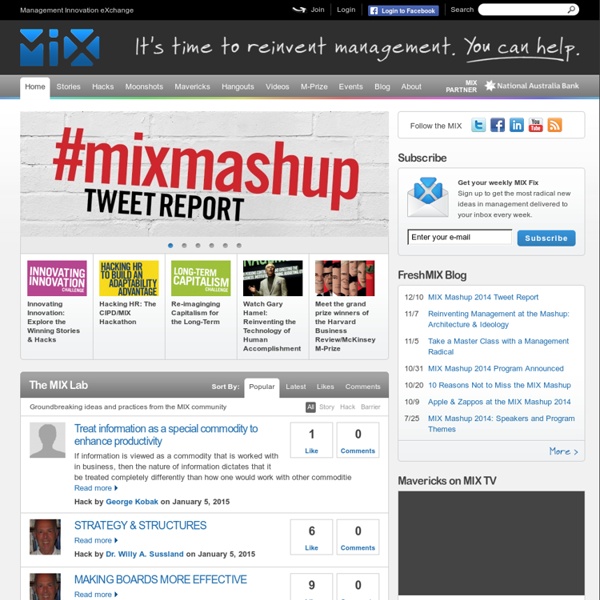



http://www.managementexchange.com/
Related: ManagementStoos Network (part 3): Core Idea One wish I had for the gathering in Stoos was to discover a common foundation that could reconcile differences between the many management thinkers, writers and consultants the world has already generated before. We have The Toyota Way, the 14 Points for Management, Radical Management, Management 3.0, Wiki-Management, Beyond Budgeting, Tribal Leadership, Servant Leadership, Elastic Leadership, the Declaration of Interdependence, and many more models, values and principles. I asked the group at Stoos, “Is there something more fundamental?”
Management encyclopedia topics Management in business and human organization activity is simply the act of getting people together to accomplish desired goals. Management comprises planning, organizing, resourcing, leading or directing, and controlling an organization (a group of one or more people or entities) or effort for the purpose of accomplishing a goal. Resourcing encompasses the deployment and manipulation of human resources, financial resources, technological resources, and natural resources. Management can also refer to the person or people who perform the act(s) of management. Overview
Cloud Company Cloud is a metaphor for the Internet and Cloud Computing is the metaphor for a technological paradigm shift in the way we utilize software and information. Technology enthusiasts often propose an idea grounded in ”technological determinism”: the idea that this new technology will drive the development of organizational practices, culture, and behavior. However, the influence and importance of culture and people cannot be underestimated. Media theorist Marshall McLuhan famously said, “We shape our tools. And then our tools shape us.” Stoos Network (part 2): Stakeholders & Personas "Who is our customer?" This was one of the first questions to pop up during the gathering in Stoos. "Which people are our target audience?” and “Who else is involved?" Or in other words: "Who are the stakeholders in organizational transformation?"
Blog Transformation change & innovation The difference between a Process in Transition and one of Change lies mainly in where the resistances appear. Top 10 Strategic Predictions for 2015 and Beyond: Digital Business Is Driving 'Big Change' Already have a Gartner account? Sign in to view this research document. Forgot username or password? New to Gartner? Register with us for FREE access to this research document. Summary
The Shingo Model - Shingo Institute - Leading a New Era of Enterprise Excellence Respect must become something that is deeply felt for and by every person in an organization. Respect for every individual naturally includes respect for customers, suppliers, the community and society in general. Individuals are energized when this type of respect is demonstrated. Most associates will say that to be respected is the most important thing they want from their employment. Stoos Network (part 1): About Communication I write this in my hotel room after having traveled back from Stoos to Zürich airport. The Stoos Gathering just ended and I’m feeling very tired. I had just 6 hours of sleep in the last 2 nights, and tomorrow I have to get up early, again, to catch my plane to Cleveland, US. My report about the proceedings of the Stoos Gathering will have to wait for a day or two. But there’s one thing I wish to clear up before I tuck in.
Precious Mettle Aside Due to the demographics, huge numbers of accomplished leaders will soon be leaving the workforce. Leadership Develops When You Escape Your Comfort Zone Successful leaders know that they must get out of their comfort zone to succeed. Great leaders from history are those who have spent a large amount of their time outside their comfort zone. Leaders who take risks and step into their learning zone are those that succeed. It’s only when you can give up what’s safe and familiar that you create opportunities and develop new capabilities. As you do, you expand your influence and gain the skills required to take on bigger and bigger challenges. In this sense, leaders are self-made and not born, they are developed, not promoted.